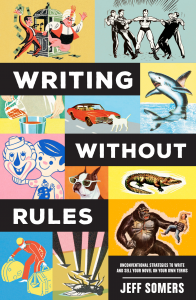Filthy Tempus

Behind all the questions writers throw at each other about process and where you write and all that is the fundamental concern of finding the time to work. Sure, some writers Have Money, or supportive spouses, or the perceived invincibility of youth, and thus can eschew things like paying bills or working for a living in order to work at their novel like it’s a job. And some writers have achieved enough in their careers that they earn their living from past work and can now focus on new work exclusively.
But for many writers, that’s not possible. We have to have Day Jobs, or we have to write 500 freelance pieces every day to support our five hungry (always so, so hungry) cats. The question of how you find the time to work under those conditions isn’t a small one.
Time Enough at Last
In 2017 I completed four full-length books (three novels and Writing Without Rules) and 20 shorter works—while also producing hundreds of freelance pieces and drinking, like, a lot of whiskey. When I make appearances writers often ask how I manage my time, and the simple answer is, I don’t.
Now, your mileage might vary. We are all different people, raised differently and baked with different obsessions and brain chemistry. So if you need to micro-manage your schedule, don’t let me tell you otherwise. But for me, the best way to find time to write is to not look for it.
Now, I have one advantage here: I write for a living, so I am literally always in front of a keyboard of some sort. So if I have a random moment of inspiration in the middle of a freelance project, I can jump over to the WIP and tap out a few dozen or a few hundred words, then jump back to paying the bills. And that’s how I approach writing: I just wait for opportunity and inspiration to line up, have at it, and at the end of the day I usually have a bit of work done without any sort of schedule or conscious effort.
A mistake some writers make (again, your mileage will vary) is to force themselves to have a schedule, whether because some other writer told them that it was the only way or because winging it hasn’t worked for them. But having a schedule shouldn’t mean you force it. Too often writers imagine that the dreaded word count is all that matters—in other words, if you end the day having written your word count goal, it was a good day, and it’s totally normal to delete all those words later in the process.
I disagree. Word count is meaningless. Produce good words. Words you’ll fight yourself to keep. If that means waiting to feel inspired, that’s OK. The key is to remain connected to your WIP, to think about it, to always be ready to dive into it, not necessarily to pour 5,000 shitty words into it every day no matter what.
At least that’s how I see it. Or maybe I’m just justifying the sheer amount of time I spend drunkenly playing Portal 2.











